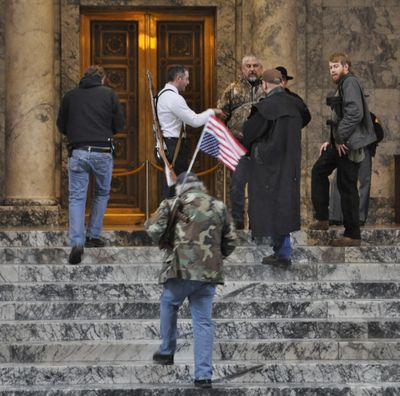Spin Control: Clash possible over new ‘no concealed guns in Senate Gallery’ rule

With the 2018 legislative session a bit more than a month away, some issues are arising that have nothing to do with the anticipated battlegrounds of the session: schools and budgets.
“Battleground” may be a bad word for an issue involving a new rule by Lt. Gov. Cyrus Habib that bars concealed weapons from the Senate Gallery even if the holder has a permit. Some may wonder, are concealed weapons currently present in the gallery?
Possibly. They’re concealed so there’s no way of knowing. There are no metal detectors in the Capitol. Washington is an open-carry state, so one can bring a rifle, shotgun or holstered pistol into the domed Legislative Building. (It is true, however, that one cannot bring a placard on a stick inside. The stick must be left outside and the sign either hand-carried or attached to your gun.)
That’s still the case, but a few years ago members of a pro-Second Amendment demonstration brought their unconcealed guns into the galleries. It caused unease even among some lawmakers who strongly support gun rights, and any outward display of weaponry was banned, just like signs, banners and outward displays of any kind.
Habib wrote to the head of security last week, saying he will extend that to concealed weapons under Senate Rules that allow him to control decorum as president of the Senate. Announcements are to be posted outside the doors, and overcoats or large bags that could conceal a firearm won’t be allowed in the galleries.
Wait a minute, Sen. Phil Fortunato said. In a letter of his own, the Auburn Republican contends Habib doesn’t have the authority to ban concealed weapons by legal permit holders. Extending rules that allow him to preserve order and decorum to concealed weapons is a stretch, since a concealed weapon doesn’t cause a disruption. And there’s a constitutional question, he added.
“You have no more ability to restrict by fiat the private exercise of a constitutional right than you could prohibit a whispered prayer in the gallery,” he wrote.
Kristina Brown, Habib’s spokeswoman, said he checked with the attorney general’s office before issuing the order. The attorney general’s office wouldn’t comment on what they told Habib, citing attorney-client privilege. But their legal adviser, Deputy Solicitor Jeff Even, is an experienced litigator on state issues.
Lawmakers can change the rules when the 2018 session starts. But Democrats will have control of the Senate for the first time in years and overruling a fellow Democrat seems unlikely.
When gun rights are involved, however, things might not stop with the exchange of letters or a few floor speeches. It’s not beyond the realm of possibility that one or more gun-rights advocate could challenge the rule with a bit of civil disobedience, trying to enter the gallery, refusing to surrender their weapon and demonstrating until they are escorted out and ticketed.
If that happens, the attorney general’s office would defend the rule if asked.
Is social media the new ‘town square’?
Another potential constitutional controversy involves lawmakers and their social media accounts.
The ACLU of Washington said last week legislators should not be blocking people with whom they disagree or deleting comments with opposing views from their official Facebook, Twitter or other accounts.
“Where lawmakers invite their constituents and the public to engage with them on matters of concern to their elected office on a social media platform, they cannot then selectively censor certain voices … simply because they disagree with their viewpoint,” Elizabeth Smith, the organization’s legislative director, wrote.
Social media currently function as a “town square” and blocking such critics or criticism amounts to censorship that violates t First Amendment free speech guarantees.
The ACLU said it has constituents who have reported being blocked or having posts deleted by lawmakers for criticizing the way they do their job. They’re not talking about threatening or vulgar language.
The organization is “encouraging” lawmakers to review their public accounts and unblock critics or undelete critical posts. They aren’t saying what they might do if that doesn’t happen, but it doesn’t take a genius to know where this might be headed if lawmakers don’t.
Taking aim at sexual harassment
Normally the call for a task force is a sign the Legislature is ducking a decision and kicking it down the road. But a recent call for a task force to come up with better ways to report sexual harassment at the Capitol might signal an improvement.
The committee that oversees Senate operations recently voted to make sure members and staff get annual sexual-harassment training, increase awareness of policies to report it and track the progress. Sen. Randi Becker, R-Eatonville, wrote to House leaders to suggest they join in to form a task force.
“We need full participation, regardless of gender, chamber or political affiliation to make sure our efforts are comprehensive and effective,” she said.